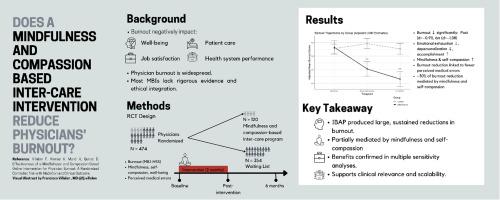Effectiveness of a mindfulness- and compassion-based online intervention for physician burnout: A randomized controlled trial with mediation and clinical outcome analyses
IF 3.7
2区 医学
Q1 PSYCHIATRY
引用次数: 0
Abstract
Background
Physician burnout remains a persistent global challenge, yet most mindfulness-based interventions are limited by small samples, short follow-up, and lack of ethical integration. This study evaluated the efficacy of a culturally adapted, ethically grounded mindfulness- and compassion-based program (IBAP) in reducing burnout among physicians.
Methods
In a randomized controlled trial, 474 Chilean physicians were assigned to an eight-week online IBAP program (n = 120) or a waitlist control (n = 354). Assessments were conducted at baseline, post-intervention, and 6-month follow-up. The primary outcome was burnout (MBI-HSS); secondary outcomes included mindfulness, self-compassion, well-being, and perceived medical errors. Analyses used linear mixed-effects models (LMMs), Bonferroni-adjusted p-values, and Cohen's d. Sensitivity analyses included multiple imputation, per-protocol, and tipping-point models.
Results
IBAP significantly reduced total burnout at post-intervention (B = −9.74, SE = 1.77, p < 0.001; d = −0.91) and follow-up (B = −11.55, SE = 1.84, p < 0.001; d = −1.08). Improvements were also observed in emotional exhaustion (p < 0.001), depersonalization (p = 0.030), and personal accomplishment (p = 0.008). Gains in mindfulness, self-compassion, and psychological well-being remained significant after Bonferroni correction. Mediation analyses showed that mindfulness and self-compassion each accounted for ∼30 % of the burnout reduction. Additionally, reductions in burnout significantly mediated lower self-reported medical errors.
Conclusion
IBAP produced large, sustained reductions in physician burnout, with effects confirmed across sensitivity analyses. The program also reduced perceived medical errors via burnout reduction, supporting its clinical relevance and scalability.

基于正念和同情的医生职业倦怠在线干预的有效性:一项随机对照试验与调解和临床结果分析。
背景:医生职业倦怠仍然是一个持续的全球挑战,然而大多数基于正念的干预措施受到样本小、随访时间短和缺乏伦理整合的限制。本研究评估了一种适应文化、基于伦理的正念和同情心项目(IBAP)在减少医生职业倦怠方面的效果。方法:在一项随机对照试验中,474名智利医生被分配到为期8周的在线IBAP项目(n = 120)或候补组(n = 354)。在基线、干预后和6个月随访时进行评估。主要终点是倦怠(MBI-HSS);次要结果包括正念、自我同情、幸福感和感知医疗错误。分析使用线性混合效应模型(lmm)、bonferroni调整的p值和Cohen’s d。敏感性分析包括多重输入模型、按协议模型和临界点模型。结果:IBAP显著降低了干预后的总倦怠(B = -9.74, SE = 1.77, p)。结论:IBAP显著、持续地降低了医生的倦怠,其效果在敏感性分析中得到了证实。该项目还通过减少职业倦怠减少了可感知的医疗错误,支持其临床相关性和可扩展性。
本文章由计算机程序翻译,如有差异,请以英文原文为准。
求助全文
约1分钟内获得全文
求助全文
来源期刊

General hospital psychiatry
医学-精神病学
CiteScore
9.60
自引率
2.90%
发文量
125
审稿时长
20 days
期刊介绍:
General Hospital Psychiatry explores the many linkages among psychiatry, medicine, and primary care. In emphasizing a biopsychosocial approach to illness and health, the journal provides a forum for professionals with clinical, academic, and research interests in psychiatry''s role in the mainstream of medicine.
 求助内容:
求助内容: 应助结果提醒方式:
应助结果提醒方式:


